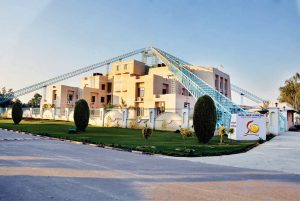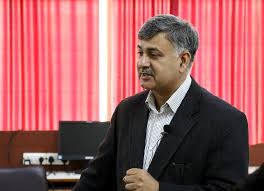Department Energy Science and Engineering
………………………………………………………………………………………………………………..
DEPARTMENT OF ENERGY SCIENCE AND ENGINEERING (ES&E)
NATIONAL INSTITUTE OF TECHNILOGY KURUKSHETRA

National Institute of Technology Kurukshetra (NIT Kurukshetra or NITKKR) is a public technical and research university located in Kurukshetra, Haryana, India. In December 2008, it was accredited with the status of Institute of National Importance (INI). It is one of the 31 National Institutes of Technology established and administered by Government of India.
It runs undergraduate and postgraduate program in Engineering and Doctor of Philosophy program in Engineering, Sciences and Humanities.
NIT Kurukshetra was established in 1963 as a joint enterprise of the Government of India and the Government of Punjab, India as the Regional Engineering College, Kurukshetra (REC Kurukshetra). In 2002, all the Regional Engineering Colleges were unified by a common entrance exam. Therefore, REC Kurukshetra was renamed to National Institute of Technology under the NIT Act and was given a Deemed University status.
Rankings
Engineering rankings
Engineering – India
NIRF (2023) 58
NIRF (2024) 81
NITKKR is ranked 81st among the engineering colleges of India by National Institutional Ranking Framework (NIRF) in 2024.

Prof. Ashwani Kumar,
Head of the Department
Department of Energy Science and Engineering (ES&E)
Message:
On behalf of the Department of Energy Science and Engineering, I heartly welcome the students who will be admitted this year 2025-2026 and the students who will join their second year of the program. The Department of Energy Science and Engineering is newly created in the year 2025 with the Board of Governors approval in its 73rd meeting held on dated 10-08-2025 under NITSER Act, 2007.
The primary goals of the department typically include enhancing energy security, promoting economic growth, improving energy access, and mitigating climate change by reducing greenhouse gas emissions including a societal impact for usage of green energy and affordable technology to the rural areas. This involves development of concepts and basics of renewable energy and its utilization, renewable energy growth, energy management, waste to energy, and alternative fuels for the energy sector. The department will facilitate research, development, and deployment of renewable energy technologies, as well as key drives towards the energy security. Specific targets often include increasing the share of renewable energy in the overall energy mix, reducing reliance on fossil fuels, and achieving net-zero emissions.
The key goals will be:
- Energy Security and Independence: Reducing dependence on imported fossil fuels, Developing and deploying alternative fuels like hydrogen and biofuels,
- Climate Change Mitigation: renewable energy sources like solar, wind, hydro, and geothermal deployment to reduce greenhouse gas emissions to combat climate change and net-zero emissions
- Economic Growth and Development: The renewable energy sector will create new jobs and industries, fostering economic growth and infrastructure improve energy access in remote and underserved areas, promoting rural development.
- Energy Access and Affordability: Expanding access to clean and affordable energy, particularly in rural areas, is a critical goal, Renewable energy technologies can provide decentralized and off-grid solutions, empowering communities with improvement living standards, support local businesses, and enhance healthcare and education.
- Sustainable Development: Renewable energy is essential for achieving sustainable development goals, including access to clean energy, climate action, and responsible consumption, integrating renewable energy into the energy mix can help create a more sustainable and resilient energy system.
- Research and Development: Facilitating research, development, and demonstration of new and renewable energy technologies supporting innovation in areas like solar, wind, biofuels, hydrogen, and energy storage.
- Policy and Regulatory Framework: Establishing supportive policies and regulations is essential for promoting renewable energy deployment that includes feed-in tariffs, renewable portfolio standards, carbon pricing mechanisms, and streamlined permitting processes.
- Public Awareness and Education: Raising public awareness about the benefits of renewable energy and promoting its adoption through public campaigns, educational programs, and community engagement initiatives.
By pursuing these goals, I hope that the Energy Science and Engineering Department can play a vital role in creating a sustainable, secure, and prosperous future.
I extend a very warm welcome to the new entrants and the already admitted students to the program.
Best Wishes
DEPARTMENT OF ENERGY SCIENCE AND ENGINEERING
The Department of Energy Science and Engineering is created in the year 2025 with the Board of Governors approval in its 73rd meeting held on dated 10-08-2025 in terms of Clause 8 (xiii) of the first Statutes under NITSER Act, 2007. The main focus of the Department is on education and research for the development in the areas of sustainable energy systems for catering the future demand of energy. The Department is interdisciplinary in nature and has a blend of science and engineering for the sustainable energy sector development and growth. Since, the Department of Energy Science and Engineering is interdisciplinary in nature and will have major focus on the energy education and research in the area of sustainable energy for the development of energy adequacy and producing highly skilled manpower catering to the requirements of sustainable energy growth in India.
The Department of Energy Science and Engineering offers the following academic programmes:
- B.Tech. Programme in Sustainable Energy Technologies (SET)
(4 Years, admission through JEE (2024))
- M.Tech. in Renewable Energy Systems (RES) (2 years THROHU CCMT AND SELF SPONSORED)
- Ph.D. Programme in the relevant areas of Energy Science and Engineering
Programme Highlights:
- An ability to learn and investigate the areas related to sustainable energy science and engineering
- An ability to apply the domain knowledge to the growth and development of sustainable energy growth and its utilization
- An ability to carry out research and development work to solve practical problems
- An ability to design and apply concepts to renewable energy applications for energy security
- An ability to design and improve renewable energy systems and assess their impact on overall sustainable development.
- An ability to demonstrate renewable energy systems applications towards sustainable growth and societal impact
MAJOR RESEARCH AREAS ARE:
- Solar PV Systems
- Solar Thermal Energy Systems and Applications
- Bio Fuels and Bio energy
- Green Hydrogen energy
- Sold waste management
- Energy management with Renewable Sources integration
- Electrical Vehicles
- Fuel Cells and Super-capacitors
- Energy Storage Technology
- Green Buildings and Energy Efficiency
- Sustainable Buildings and Green Buildings
- Energy Policy, Energy Markets and Economics
- Wind Energy Systems and Applications
- Microgrid energy management and sustainable designs
- Phase Change Materials and Applications
- Solar PV refrigeration and air conditioning
- Thermal Cooling systems
- Circular Economy
- Smart Grid/Micro Grid Technologies
Website: https://nitkkr.ac.in/sree
Bachelor of Technology
in
Sustainable Energy Technologies (SET)
The accelerated development of the global economy is leading to increasing consumption of natural resources. The exploitation of conventional energy resources is moving at an accelerated pace due to industrialization, however their availability is decreasing. The biggest problem that will arise in the coming years is the depletion of conventional sources. There is therefore an utmost need for the preservation of energy stability and efficiency at the global level. Uncontrolled industrial growth, accompanied by increasingly intensive depletion of non-renewable natural resources, especially fossil fuels, has caused enormous pollution of the environment and the entire planet. In the conditions of depletion of natural resources, negative climate changes accompanied by global warming and there is a serious threat to the survival of life. Therefore, it is necessary to adopt and implement the concept of sustainable energy development. The concept of sustainable development explicitly aims to achieve optimal economic outcomes, while preserving and improving the environment and the social component of the development. Natural resources play an extremely important role in achieving economic growth and development.
Energy stability and efficiency are thus crucial for successful functioning of modern economies. Renewable energy sources (solar energy, wind energy, water flow energy, biomass, etc.) are gaining in importance with a tendency to increase their share in total energy production and consumption in India and globally.
In this context the, The Department of Energy Science and Engineering is offering a new B. Tech program in Sustainable Energy Technologies.
About the Program:
The Department of Electrical Engineering initiated a new B. Tech program in Sustainable Energy Technologies which has been offered from the session of 2024-2025 with initial annual intake of 60 students. It is a specific field of science and engineering dealing with alternative/sustainable energy technologies and energy efficient technologies for sustainable growth of the energy sector.
Now with the creation of New Department named as Department of Energy Science and Engineering, the B. Tech. Program on Sustainable Energy Technologies will be run under the new Department with the Board of Governors approval in its 73rd meeting held on dated 10-08-2025 in terms of Clause 8 (xiii) of the first Statutes under NITSER Act, 2007.
The primary goal of the B. Tech. Program in Sustainable Energy Technologies (SET) is to provide students with engineering skills and with the knowledge base and the practical knowledge of how to use energy in the most environmental friendly and in an economical way and with a foundational knowledge needed to excel as energy engineers and leaders in the modern-day energy industry. The students of the program, on successful complication, are expected to acquire a variety of highly relevant knowledge and skills that include assessment and characterization of various energy resources, design and development of various energy technologies and systems, selection of appropriate technologies amongst different alternatives and contribution towards the transition to a low carbon economy. Energy engineering being interdisciplinary by virtue is a broad discipline. The Department has chosen to offer a wide-spectrum of sustainable energy technologies.
Sustainable Energy Technologies being interdisciplinary by virtue is a broad discipline that will have amalgamation of engineering and sciences. The Department has chosen to offer a wide-spectrum of areas in energy technologies. The specific areas include but are not limited to the following, Renewable energy systems, Energy efficiency, Wind and large-small-hydro, Bio-energy, solar photovoltaic, Modelling and simulations, Energy policy and management, power engineering, and alternative fuels, energy storage, waste energy management, green buildings, etc.
The specific goals of this programme are to create skilled-manpower to enable our aim to support a carbon-free economy by delivering safe, clean, reliable, sustainable and competitive energy in the present scenario of modern power sector.
The objective of the 4-year B.Tech. programme is to produce specialist engineers to meet the challenges of the energy sector growth with green energy and highly analytical skills. The course has been designed for the energy sector with relevant subjects in the multidisciplinary areas from electrical engineering (e.g. power electronics, power systems, electrical machines—), mechanical engineering (e.g. thermodynamics, thermal engineering-bio fuels—), and sciences (e.g. nano/ smart materials, fuel cells,— ). In addition, there are the core energy courses providing the required background for analyzing and designing energy systems for sustainable growth of energy sector.
Salient Features of the Program
(a) Opportunity to learn about both Renewable and Non-renewable Energy sources
(b) Emphasis on Building Conceptual Clarity, Mathematical rigor and Hands-on Training
(c) Developing Multidisciplinary Capabilities
(d) Holistic Approach to make understand Energy-Environment Interactions
(e) In-depth coverage of Design development and appraised of Energy Projects
(f) Offers excellent alignment with growing demands on Industries
(g) Facilitation to pursue Enterpreneurship and product Development
Career path the students can opt after B. Tech completion
- Research Industries in designing, developing and building of renewable energy technologies.
- Integration of renewable energy generation into existing power systems
- Electrical Power and Energy Companies dealing with growth and supply of Renewable Energy to the Power Sector
Master of Technology
in
Renewable Energy Systems (RES)
ABOUT THE PROGRAM:
The M. Tech. program initially started in the year 2012 under the SCHOOL OF RENEWABLE ENERGY AND EFFICIENCY (SREE). The school offered the M. Tech. program in Renewable Energy Systems (RES) with an intake of 25 students and PhD program in multidisciplinary areas. Now the new Department named Department of Energy Science and Engineering (ES&E) is created with the approval of the Board of Governors approval in its 73rd meeting held on dated 10-08-2025 in terms of Clause 8 (xiii) of the first Statutes under NITSER Act, 2007.
Now the Department offers both the B.Tech. Program in Sustainable Energy Technologies (SET) and M. Tech. program in Renewable Energy Systems (RES). The department also offers PhD program in the multidisciplinary area of energy science and sustainable energy technologies. The Department of Energy Science and Engineering aims to find sustainable solutions to global energy requirements, energy security and green energy as a major source and environmental degradation because of fossil fuels as the global energy systems will experience major challenges in the coming decades. These challenges demand the growth of scientific knowledge, innovative-technology development for sustainable energy, policy measures, and initiatives ti be taken at local and global level. The sustainability of the energy systems will prove to be of prime importance environmentally, economically and socially. Although the fossil resources have been fundamental source of energy for human existence since long time in everyday life and now the time of oil discoveries are almost over. Addressing the challenges arising from issues of energy scarcity will involve a massive increase in the utilization of sustainable energy resources like wind, solar and biomass. This transformation will not take place overnight but decades. For this reason, high priority to use renewable energy systems and energy efficient buildings should be given. The Department of Energy Science and Engineering has aims to share the knowledge and research at the scale of individual components as well as of large-systems, with a focus on the interaction between these two. The department will develop the man power and research in renewable energy systems for future sustainable energy sector. The department has the vision to develop the sustainable technology and its growth for energy security through wide-ranging team-work and partnerships with MNRE, Govt. India, the private, public sectors as well as national and international collaborators and responsibilities in the policy process.
The programs have the domain in the subjects as:
Small Hydro
Power Systems
Wind energy
Electrical Energy Management
Thermal Engineering
Solar PV Systems
Power Electronics in Renewable Energy
Grid Integration of RES
Fuel Cells
Energy Integration & Conservation in Process Plants
Solar Pond
Solar Drying
Electric Vehicles
Alternative Fuels
Energy use in Transport
Materials and Safety
Markets and Policy
Green and sustainable Buildings
Waste energy management
Smart Grid Technologies
Circular Economy
Major Recruiters will be:
- Green Rating for Integrated Habitat Assessment (GRIHA) Council
- Energy Efficiency Services Ltd (EESL)
- PricewaterhouseCoopers Pvt Ltd (PWC)
- Lloyds Register
- BuroHappold
- Amplus Solar
- Innovative Solar
- Oorja Energy
- RAYS Power infra
- Manikaran Power Limited
- Mahindra Group
- ADANI Green Energy
- Suzlon Energy
- Azure Power
- JSW Energy
- Inox Wind
- Greenco Energy
- Larsen & Toubro
- Renew Power
- The Energy and Resources Institute (TERI)
- Genesis Ray Energy
- Tata Power
- Confederation of Indian Industry (CII)
- EDS Global
- Sphera
- Cygni Energy Private Ltd
- Systra India
- Log9 Materials
- D2O
- Ayana Renewable Energy

Well Designed laboratories
Facilities of Interdisciplinary research
Well educated and Qualified faculty members
- Tech. program (Renewable Energy Systems) with intake of 50 was started in the month of July, 2012. (Ist and 2nd year), 12 batches graduated, 15 Registered PhD students presently, 17 awarded and well placed. Presently there are10 Faculty Members (Joint Faculty from Electrical and Mechanical Engineering Depts.)
Contact Details
Dr. Ashwani Kumar, Professor
Head of the Department
Phone: 9416366091
E-mail: sree_coordinator@nitkkr.ac.in
